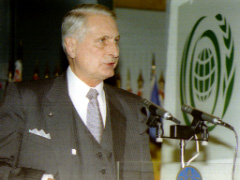


LITHUANIA - LITUANIE - LITUANIA | ||
His Excellency Algirdas Zemaitis, Ambassador Extraordinary and Plenipotentiary and Permanent Representative to FAO of the Republic of Lithuania | ||

While I would like to repeat all the sentiments expressed by the previous speakers and also give thanks to the organizers, I believe in keeping to the established order. Therefore my statement might surprise you in its brevity. I am honoured to address this most important gathering, the first such meeting on the human right to food and adequate nutrition, on behalf of the President and the Government of the Republic of Lithuania. The Government of Lithuania fully supports the principles and the Plan of Action of the Rome Declaration on World Food Security. Indeed, it is more than intolerable that over 800 million people throughout the world are so chronically undernourished and that 200 million children under the age of five, who are our planet's hope and future, suffer from protein deficiency and energy deficiencies. In order to correct this unacceptable situation, urgent and well-coordinated action is required not only by governments but also for the entire rural community. After restoration of independence in 1990, Lithuania has been undergoing a very difficult transition period from a planned to a free market economy. As a result of the necessary restructuring of our entire economy, the agricultural sector presently accounts for only some 15 percent of GDP compared to 50 percent before the initiation of this reconstruction. Consequently, we are not able to achieve the production and, in particular, export levels of the late 1980s. Nevertheless, we are currently carrying out major restructuring activities requiring substantial amounts of investment from both domestic and foreign sources. On the positive side, privatization of agricultural assets has almost been completed and the process of restoration of land to private owners is continuing. New production structures are emerging; agricultural companies and cooperatives produce about one-third of all agricultural output, whereas private farmers and other smallholders, with an average farm size of only 3.3 hectares, account for the remainder. In short, while we still have a long way to go, we are beginning to see the light at the end of the tunnel. Realistically we cannot expect to regain the production and export levels of the late 1980s in the near future. Our immediate objective is therefore to concentrate on food self-sufficiency at home and to focus on the development of export markets. This is imperative in order to ensure employment for the 32 percent of our population which is dependent upon agriculture. In conclusion, please permit me to quote from a letter from the President of the Republic of Lithuania to the Director-General of FAO, which clearly emphasizes our great concern with the food insecurity problem in the world and demonstrates our readiness to assist in its eradication. I quote: "I and the Government of the Republic of Lithuania appreciate your initiative to gather global forces for action in order to overcome the problem of food insecurity in the world. Lithuania, as a Member of the Food and Agriculture Organization of the United Nations, supports your proposal to convene the World Food Summit of Heads of Governments and, subject to the existing opportunities, is ready to contribute to the solution of the food resources problem." | ||

 |